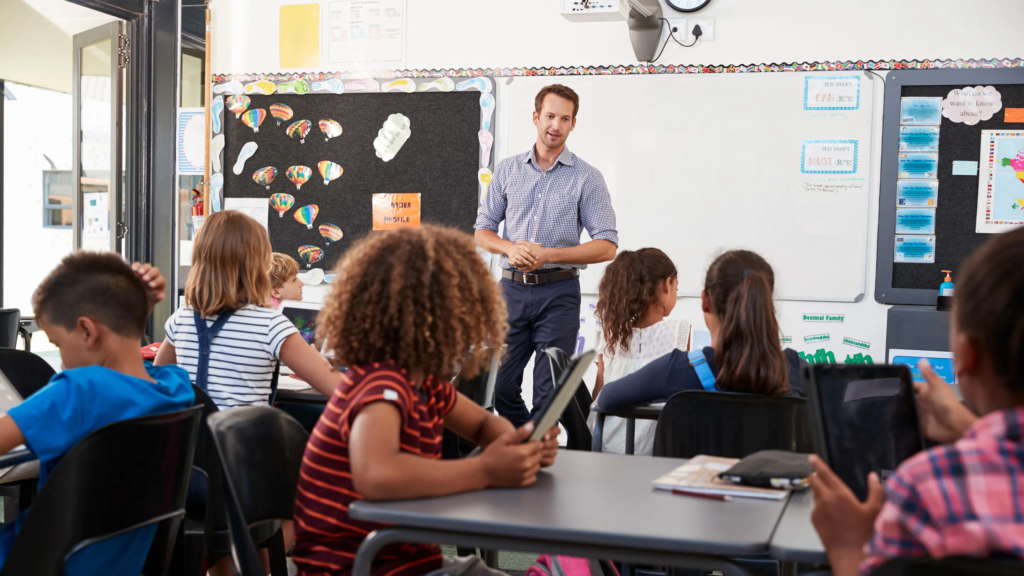The Role of a Government Teacher.50https://files.eric.ed.gov/fulltext/EJ872650.pdf

Introductionhttps://my.chartered.college/research-hub/collaborating-with-colleagues-for-professional-development/
Government teachers play a crucial role in the educational landscape, serving as key figures in shaping the minds of future generations. They are not only responsible for imparting knowledge but also for fostering critical thinking, civic responsibility, and a love for learning. This article explores the multifaceted responsibilities, qualifications, challenges, and rewards of being a government teacher.
Responsibilities of a Government Teacher
1. Curriculum Development

Government teachers must develop and implement lesson plans that adhere to state and national educational standards. This involves creating engaging and inclusive curricula that cater to diverse learning styles and interests. Teachers must integrate various subjects and skills, ensuring students receive a well-rounded education.The Role of a Government Teacher.50
2. Instruction and Teaching

Effective teaching goes beyond mere lecturing. Government teachers engage students through interactive discussions, group activities, and hands-on learning experiences. They must adapt their teaching strategies to meet the needs of all students, including those with different learning abilities or backgrounds.
3. Assessment and Evaluation
The Role of a Government Teacher.50
Assessing student progress is a critical part of a teacher’s role. This includes designing tests, quizzes, and assignments that accurately measure understanding and skills. Providing constructive feedback helps students identify areas for improvement and encourages a growth mindset.
4. Classroom Management
Creating a positive classroom environment is essential for effective learning. Government teachers establish rules and expectations that promote respect, inclusivity, and collaboration. They must also manage student behavior and resolve conflicts, ensuring that all students feel safe and supported.
5.

Collaboration with fellow educators is vital for professional growth and improved student outcomes. Government teachers participate in staff meetings, workshops, and professional development programs to share best practices and stay updated on educational trends.
6. Engagement with Parents and the Community
Building relationships with parents and the community enhances the educational experience. Teachers communicate regularly with families about student progress and involve them in school activities, fostering a supportive network around students.
Qualifications Required
1. Educational Background

To become a government teacher, a bachelor’s degree in education or a relevant subject area is typically required. Many positions also prefer or require a master’s degree, especially for higher-level teaching roles.
2. Licensing and Certification
Teachers must obtain state certification or licensure, which often involves passing examinations and completing a student teaching internship. This process ensures that educators are well-prepared for the classroom.
3.

Effective government teachers possess strong communication skills, patience, and adaptability. They should be passionate about teaching and have a genuine interest in their students’ success. The ability to foster a positive learning environment is crucial.
4. Experience
Practical experience, such as student teaching or internships, is essential for developing teaching skills. Involvement in extracurricular activities, mentorship programs, or community service can also enhance a teacher’s qualifications.
Challenges Faced by Government Teachers
1. Limited Resources0https://files.eric.ed.gov/fulltext/EJ872650.pdf
Budget constraints often lead to a lack of supplies, technology, and support services. Teachers must find creative ways to maximize available resources, which can be challenging.
2. Diverse Student Needs
Classrooms are often filled with students from various backgrounds and with different learning abilities. Teachers must differentiate instruction to meet these diverse needs, which can be demanding and time-consuming.
3. Standardized Testing Pressure
The emphasis on standardized testing can create stress for both students and teachers. Balancing test preparation with comprehensive education is a significant challenge.
4. Work-Life Balance
Teaching can be an all-consuming job, with many teachers spending hours on lesson planning, grading, and professional development outside school hours. Finding a healthy work-life balance is essential to avoid burnout.
5. Policy Changes and Bureaucracy
Government teachers must navigate shifting educational policies and bureaucratic requirements, which can sometimes distract from their primary focus: teaching.
Rewards of Being a Government Teacher
1. Impact on Students’ Lives
One of the most fulfilling aspects of being a government teacher is the ability to influence students positively. Witnessing a student’s growth, academic achievements, and personal development brings immense satisfaction.
2. Job Security and Benefits
Government teaching positions often come with job stability, health benefits, and retirement plans, making it an attractive career option. Public school systems typically offer competitive salaries and opportunities for advancement.
3. Professional Development Opportunities
Government teachers have access to various professional development resources, including workshops, conferences, and further education. These opportunities allow teachers to enhance their skills and knowledge, benefiting both themselves and their students.
4. Community Involvement
Teachers are integral to their communities, fostering relationships with students, families, and local organizations. This connection enriches the educational experience and enhances the support network available to students. The Role of a Government Teacher.50
5. Personal Fulfillment
The joy of teaching and the opportunity to inspire young minds can lead to a profound sense of personal fulfillment. Many teachers find their work deeply rewarding, as they contribute to society by shaping future leaders.
Conclusion
The Role of a Government Teacher.50
The Role of a Government Teacher.50https://my.chartered.college/research-hub/collaborating-with-colleagues-for-professional-development/
The role of a government teacher is vital in fostering educated, responsible citizens. While the profession comes with its share of challenges, the rewards—impacting students’ lives, job security, and personal fulfillment—make it a worthwhile endeavor. For those passionate about education and dedicated to making a difference, a career as a government teacher offers a unique opportunity to leave a lasting legacy.
Feel free to modify or expand any section as needed!







